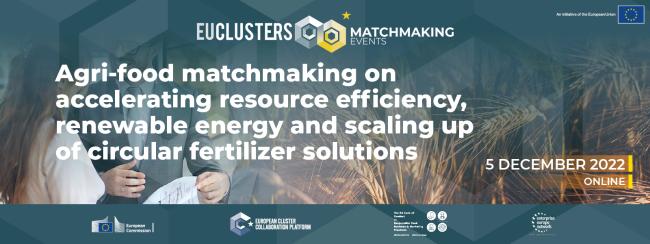Invitation for the Agri-food matchmaking event

Agri-food matchmaking on accelerating resource efficiency, renewable energy and scaling up of circular fertiliser solutions. Organised by the ECCP on the 5th of December 2022 online.
Context and objectives
This matchmaking event, including its preparatory webinar, will focus on the agri-food ecosystem and in particular on the topics of:
- uptake of resource efficiency technologies,
- deployment of renewable energy and
- scaling-up of innovative circular fertiliser production methods.
In line with the objectives of the EU industrial strategy updated but also in the framework of the Farm to Fork strategy and the Circular Economy Action Plan, European companies – in particular, SMEs - should take actions to save resources (water, energy, waste) and engage in the circular economy.
The uptake of resource efficiency technologies by agri-food SMEs will be crucial to support their competitiveness and enable the sustainability transition of the agri-food ecosystem. This uptake could be realised by SMEs individually or initiated through clusters to generate a more significant effect throughout the value chain.
According to the FAO, agri-food systems consume about 30% of the world’s energy, and a third of agri-food systems' emissions of greenhouse gases stem from energy use. Russia's military aggression on Ukraine and the impact of such geopolitical tensions on the energy prices heavily impacting the EU agri-food value chain make the shift towards renewable energy even more urgent in this industrial ecosystem. Deploying renewable energy production in a given area creates many opportunities for the decarbonisation of the ecosystem. Promising projects include collaboration between SMEs and large companies in a cluster and, eventually, with energy investors, who could invest in projects in return for a part of the electricity produced.
Since the Russian invasion of Ukraine, the supply of fertilisers to the EU has been significantly disrupted, and their prices have almost tripled compared to last year. With up to 60% of EU fertiliser imports coming from Russia and Belarus, scaling up demonstrated alternative fertiliser production methods will be essential. The EU fertiliser industry is working on switching to producing low-carbon ammonia and other circular nutrient sources. These efforts must be complemented with new innovative circular approaches, as it is crucial to secure the number of fertilisers needed for agricultural production and thus to ensure food supply within the EU.
VIDEO FROM THE PREPARATORY WEBINAR HERE
DOWNLOAD ALL SPEAKERS SLIDES HERE